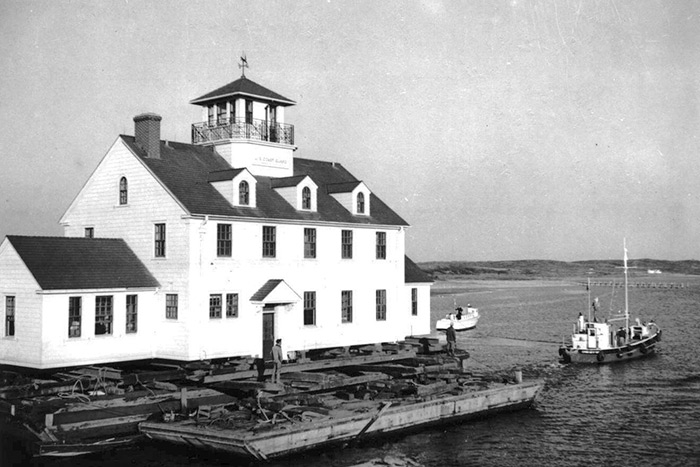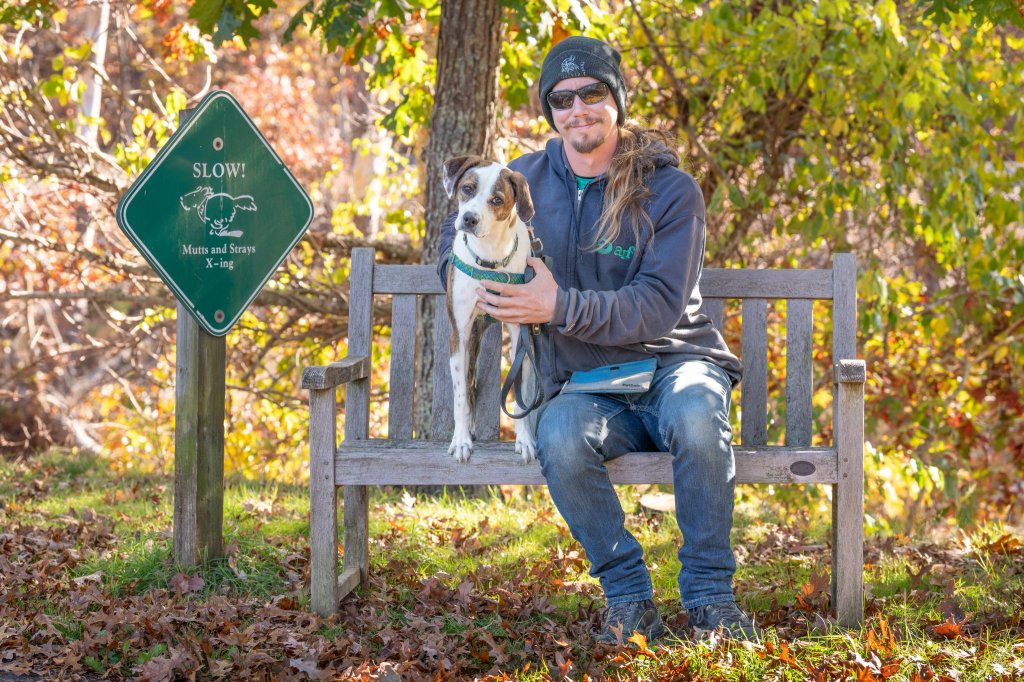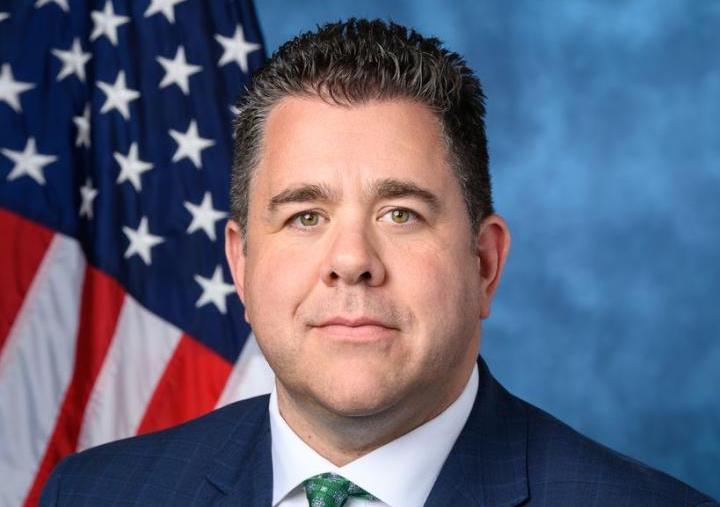The Long Tow: When the Napeague Coast Guard Station Headed Out to Sea

My father took to Montauk like a duck to water when we moved there in 1956. As the pharmacist, he was a respected member of the community. At times, it meant getting up in the middle of the night to fill a prescription. He did that, and he never let anybody down. He joined the fire department. I still have his red firemen’s hat hanging on the bedroom wall at my home. Every time I look at it, I can see him out there in the middle of the street, wearing it, directing traffic around the fire, wherever it might be, as the younger men in the department, with all their fire equipment, put the fire out. Dad also bought a small fishing boat, a 29-foot affair with an inboard engine and a little cabin and a wheelhouse. He kept it in Montauk Harbor and loved to go fishing in it for blues out at the Point under the lighthouse. He found time to do that with some friends about once a week.
He and I, and maybe three of his fishing buddies, would walk out the dock to the Montauk Marine Basin, where we’d say hello to Carl Darenberg Jr., a man covered with engine grease who owned the place. Then we’d get on the boat and go out. I did this with him maybe twice. The first time, when I got seasick, I was told it was pretty rough out there. The second time I got seasick there were no excuses. It was calm as glass. I went below and lay on one of the bunks, groaning softly until we got back. Going out in fishing boats was not for me.
What a fate, I thought, as I was assisted up the dock to the car. Here I am, the newspaperman in a fishing village and I can’t go out in a boat.
Carl Darenberg Jr. ran the marina with his family, which consisted of his wife and two kids and two black labs. Out in front of the marina, he had a 20-foot steel crane for hauling boats and a heavy-duty fish scale. If you caught an 800-pound swordfish or shark, he could haul it up with the scale winch, weigh it and take pictures of it. He had a general store and a garage on the property into which you could haul ships in order to rebuild engines and repair hulls.
I went to see Carl Darenberg in the springtime, as I did every other merchant in town in those years. He would listen patiently as I told him my plans for the newspaper that summer and what the different sized ads cost. Sometimes, as I told him about it, I was surprised that he didn’t seem to acknowledge my enthusiasm in any way. Others did when I talked about the virtues of the paper. But soon I came to see this was just him. He had been in the Navy in the war, and, like many others who had been in combat during that awful conflict, he had a military bearing and a reserved and quiet way about him. As I spoke, he would indeed give me his full attention. And when I was done, he would be clear with his reply. He would be in. Or not. There was no waffling, no come back tomorrow. If he was in, he’d tell me what size ad he wanted and for how long. And then he’d thank me for my time.
Around midnight at the beginning of the summer of 1963, fire broke out down at the docks. The siren woke me. I padded to a bedroom window, and I could see flames flickering down there. Then I heard my dad banging around in the dark hallway, on the stairs, out the front door and to the car. He drove off. I went back to sleep.
In the morning, I learned that the general store and repair bay at the Montauk Marine Basin had burned to the ground. I went down there and took pictures. I interviewed the fire police, who were still there in the smoldering ruins, and the chief told me that the fire was suspicious.
“We think there might have been somebody who had a grudge against the Darenbergs,” he said. I stayed out of it.
No one ever did find out who set fire to the Marine Basin, but the Darenbergs carried on. The renters already had their boats in the slips when the fire happened, and none of the boats were damaged. Certainly there were other places along the docks where people could get supplies. After a few days, I went down to see Carl, who was working out of a trailer. He had signed up for an ad.
“Keep the ad in,” he told me. “People have to know we’re still open.”
Construction got underway in the fall, and by March it was almost complete. But then, incredibly, one night the entire place burned down again.
I was away at college at the time. It was as bad as the first fire, my father told me. And the next day there had been a town meeting at the firehouse. Everyone was there. The town still didn’t know who did this, but they were not going to put up with it. It was decided that the entire town, en masse, would rebuild the place, stick by stick, exactly as it had been before. They had the plans and they had the earlier permits. And they would work 24 hours a day, 7 days a week, and get the job done in 30 days so the Darenbergs could be open by May, as scheduled, in time for the summer season.
I still recall going down to the Marine Basin that spring after the work was done. I walked creepily around the general store and the repair garage, looking carefully at them. They looked fine. Although, to tell you the truth, I thought some of the finishing work was a bit sloppy. And at least two of the windows had been put in crooked.
Inside, after noticing Carl was not at the counter, I asked where he might be and was told he was up in his office. I went to the narrow stairs at the back of the store and up to the second floor to see him. He was at his desk.
“How are you doing?” I asked.
“We’re okay.”
I noticed behind him, there was a framed photo that I had not seen before. It appeared to be a house on a barge. In fact, now that I looked at it more closely, I could see it was the Montauk Coast Guard Station on a barge, being pulled through the water. A young man was on the barge but I couldn’t make out who it was.
“That was me,” Carl said, noticing I was looking at it.
“I hadn’t seen that before,” I said.
“Well, I brought it here from home. We had other pictures here. The battleship I was on. But now they’re gone. Well, I thought I’d bring a few new ones from home.”
“What are you doing with that Coast Guard Station?”
I motioned to the Coast Guard Station itself. It was right out the window, across the Harbor, on its own little island at the end of Montauk Harbor—a three-story, white-shingled building overseeing everything.
“I’d come home from the war. Didn’t know what I wanted to do with myself. And then somebody told me the Coast Guard was looking to move the old Napeague Station out to Montauk.”
“I never knew there had been a Coast Guard station in Napeague,” I said.
“It was right on the ocean, about 10 miles from here. They had a plan, I think it was from Kennelly, the house mover, to just tow it out across the dunes to the highway and then down the 10 miles into town and out to the fishing village. They had a price. Seemed like a lot to me. And then I thought, I could do this better and faster and a whole lot cheaper another way. So I gave them my price.”
“You towed it through Gardiner’s Bay.”
“It just seemed like such an easy thing to do. All you’d have to do is tow it a few hundred yards through the dunes, across the highway and the railroad tracks and you’d be right on the beach at Napeague Harbor. It’s perfectly calm there. My dad had a fishing boat—he was running this marina then—and he said he would lend it to me. We’d build a platform at the beach, slide the house onto it, and then tow it out into the harbor and into the bay, then along the shore to the jetties and the entrance to Montauk Harbor. The other way of bringing it to Montauk, with the problems in the center of town, the turn onto Flamingo Road, then the turn down Westlake to the causeway, then still another turn out onto Star Island—that would take days. We could do this in hours.”
“Seems like it ought to have worked.”
“Well, I never had done anything like this before. But I figured, what could I lose? I applied. I won the bid. And so we towed it across the dunes and onto the platform. And the only problem we really encountered was out in the bay. And it was really scary.”
I couldn’t imagine Darenberg scared of anything. “Why?” I asked.
“Myself and my mate were on my dad’s boat, and we had the house about a hundred yards behind us at the end of a heavy rope, and we were moving right along, and then the wind came up.”
“Oh?”
“And then the rope went slack. The Coast Guard station, pushed by the wind, was gaining on us. We’d been doing about five knots. No sense doing this anything but careful. But now we accelerated to seven knots to make the rope taught again. But it didn’t work. We went up to 8, then 9, and at 12 knots we got the rope taut again.
“So now the engine was pulling pretty hard and it had started smoking a bit, but just as we were within sight of the jetties at the harbor entrance, the wind picked up even more and once again the house started gaining on us again. Fourteen knots was all we had. We were at full speed. The house was now just 50 feet behind us and gaining rapidly, and there was no way we could make the turn into the jetties with this house.”
“I can see where that could scare the hell out of you,” I said.
“The Coast Guard station was going to go right out to sea. It was going to be a disaster. And there would be nothing we could do about it. It would even be pulling us with it, unless I cut the rope.
But then, as the house pulled up even with us, I got this idea. I told the mate to take the wheel and just keep her steady and I was going to take a big chance so pull up close because I was going to jump across. And I did.
“I ran inside the house and quick as I could, opened up all the windows on the ground floor, then ran upstairs and opened the windows on the second floor and then ran upstairs to the low bunkhouse attic and opened the dormer windows up there. I could feel the breeze. The wind was blowing through. And then I felt a jolt as the rope went taut. I looked out. Ahead of me was the boat, turning into the harbor with the mate jumping up and down whooping and hollering. And the house was following him in. So that’s how we came in through the jetties, with him on the boat and me at the house. And we made it.”
“That is a GREAT story,” I told him.
Darenberg smiled. I had never, ever seen him smile before.
“I think about all this every time I see this picture,” he said. He paused. “And I’ll take the same ad I had last year.”



